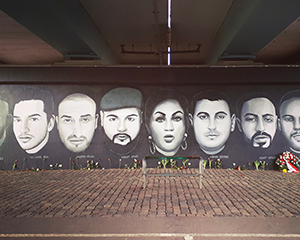The Regional Research Center Transformations of Political Violence (TraCe) published its first TraCe Policy Brief titled “Three Years Since Hanau: How Inclusive is Germany's Contemporary Remembrance Culture?”. The authors, Sabine Mannitz, Lea Deborah Scheu and Isabelle Stephanblome from PRIF, critically examine German remembrance culture and reflect first initiatives to make it more inclusive.
As Germany's culture of remembrance primarily focuses on the Nazi past, the collective responsibility is preeminent to ‘never again’ allow dehumanizing violence to resurface. The past 30 years, however, have seen several racist attacks committed by right-wing extremists or terrorist groups such as the xenophobic riots in Hoyerswerda and Rostock-Lichtenhagen, deadly attacks in Munich, Kassel, Halle and Hanau or the murders by the NSU terrorist group. How are these acts of violence dealt with in the country's collective memory?
Despite the relatives of victims engaging in remembrance work, lively social media debates on the experiences of belonging and postmigrant identity or endeavors by civil society and academia, the authors criticize that the broader societal culture of remembrance does not yet reflect these continuities of violence. They examine the struggle of the “Initative 19. Februar”, an organization remembering the victims of the right-wing terrorist attack in Hanau 2020, for a central memorial to be built and argue that the representation of the Hanau attack “will be significant for the creation of an inclusive remembrance culture beyond the city itself”.
Pointing to the emerging debate on inclusive remembrance, the authors propose to strengthen and institutionalize these efforts and stress the importance of “interweaving this process with the existing culture of remembrance.”
